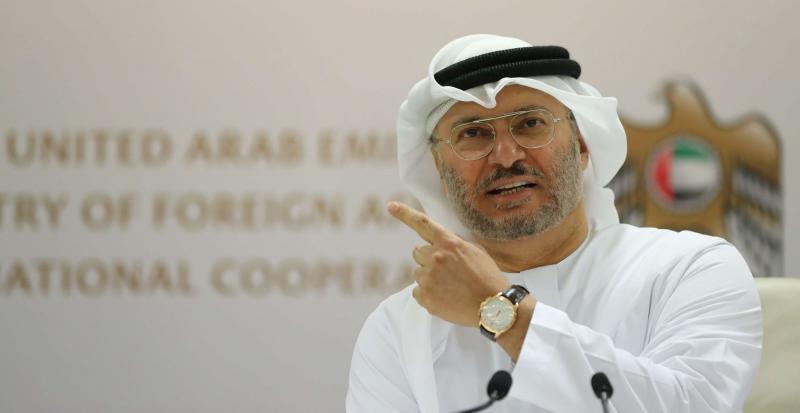Seeking a new approach to Gulf security
The speech by Anwar Gargash at the Abu Dhabi Strategic Forum was the clearest Arab call yet for a new approach to Gulf security.
Envisaging “collective diplomacy,” Gargash, the UAE minister of state for foreign affairs, implicitly acknowledged limitations in United States “maximum pressure” on Iran, in place since US President Donald Trump withdrew from the 2015 nuclear deal, officially known as the Joint Comprehensive Plan of Action (JCPOA).
Gargash emphasised the dangers in linked crises with September’s attacks on Saudi Aramco oil facilities, Turkey’s intervention in Syria, Israel’s threats to annex more Palestinian land, unrest in Iraq and Lebanon and “ongoing conflicts” in Yemen and Libya. “Further escalation… serves no one,” he argued.
Gargash offered no simple solutions but demanded bravery and patience in establishing a new process involving the United States, Europe and Gulf countries through which “strong regional multilateralism” would tackle Iran’s missile programme and its “aggressive” regional policies. Might this reflect a wider mood among decision-makers?
In October, Chatham House published “Getting to a New Iran Deal,” a report based on interviews with 75 policymakers and analysts from the United States, Iran, the United Kingdom, France, Germany, Israel, Russia, China, the United Arab Emirates and Saudi Arabia. These are exactly the people needed to deliver what Gargash envisaged.
The interviews were off the record. “It’s a sensitive topic and we wanted people not to feel bound by political allegiances, to speak more freely,” said report co-author Sanam Vakil, deputy head of Chatham House’s Middle East North Africa Programme, currently visiting Saudi Arabia.
Respondents were asked about options. There was wide agreement that Trump’s approach contributed to regional instability and divided Washington from Europe. US withdrawal from the JCPOA was based on “the belief that the sustained economic pressure and sanctions could force Iran to renegotiate the JCPOA,” said the report, but respondents “repeatedly pointed out that Tehran’s calculations are not solely predicated on economic variables.”
The economic evidence is mixed since the Chatham House interviews were conducted between December and June. While Iran’s economy is in a severe downturn, it is predicted to stabilise next year, with the World Bank forecasting 0.5% growth in 2020-21.
“Iran is not going to change its course because of GDP figures,” said Vakil. “They are going to change their course when they get some kind of offer. They need to be able to justify coming back to the table. Otherwise, Iran will continue to double down, breaching the nuclear file and potentially escalating in the region.”
The survey said there was broad support for an expanded, strengthened JCPOA, with extensions to its “sunset clauses” (the limits to Iran’s nuclear activities begin to expire in 2025) and expanded monitoring by the International Atomic Energy Agency. Even US correspondents rejected as unachievable the US demand that Iran give up all uranium enrichment.
“Getting to a New Iran Deal” examined the possibilities both for bilateral US-Iran engagement, including the kind of tete-a-tete loved by Trump, hopes for which fluttered briefly during the G7 in August and a more complex, comprehensive process.
Only 16% of respondents said a bilateral breakthrough between the United States and Iran was viable, although those respondents were primarily American and Iranian. Most experts were, said the report, “highly sceptical,” with many identifying obstacles in probable obstruction from Russia and China as well as domestic opposition in both the United States and Iran.
Such obstacles could be overcome, respondents said, through a wider process. Washington, however, remained crucial. Said Vakil: “There was a wide feeling that Washington was needed to provide assurances for regional actors, including sanctions relief for Iran.”
Hence 32% of respondents said an improved “JCPOA+” was possible while another 23% said they saw a more realistic way forward in formally separate deals on nuclear, ballistic and regional issues. More pessimistically, 27% said they “did not consider any diplomatic outcome possible,” which was the result most commonly cited in Russia, the United Kingdom and Saudi Arabia.
While the Gulf Arab countries “are all talking from the same script,” the report suggested a difference in approach between the United Arab Emirates and Saudi Arabia. “The UAE has been pursuing a quiet bilateral de-escalation with Iran,” said Vakil, “whereas Riyadh is not pursuing this pathway. They don’t want to sit down with Tehran.”
Vakil said her recent visit to the United Arab Emirates had not produced “specific confirmation” of reports that Prince Tahnoun bin Zayed, the UAE national security adviser, visited Tehran in October but she agreed that Gargash’s speech to the Abu Dhabi Strategic Forum reflected a wider Emirati approach including “back-channelling.”
“If you talk to Gulf diplomats off the record, they will acknowledge there will have to be quid pro quo [with Iran] but it’s hard to move away from the official position,” Vakil added, “and they see ‘maximum pressure’ as constraining Iran, even if negotiations are seen as the end game.”
Gareth Smyth has covered Middle Eastern affairs for 20 years and was chief correspondent for The Financial Times in Iran.
This article was originally published in The Arab Weekly.







